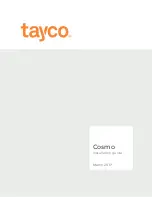
The DMIX-600 (and all Cortex products) are designed to interface with
all driverless USB devices. This means that if the product does not
require proprietary driver software and can be accessed natively by a
PC or Macintosh computer, it should be compatible with the Cortex.
Note that just because the product works on a computer without using an
included driver disk, that does not mean that it is truly driverless.
In theory (but sometimes not in practice), any device that doesn’t require
a driver should work just fine with the Cortex. However, varying specifi-
cations of certain products (primarily USB flash memory) sometimes might
present an incompatability issue. As one might imagine, testing every
USB peripheral on the market would be a lifelong quest, and the intro-
duction of new peripherals on the daily basis would make it even more
difficult.
If you are having trouble with a specific peripheral, please find the com-
patability advisory section of our website, and let us know! In the vast
majority of cases, support can be added for sub-standard units that
deviate from typical specifications.
• USB Compliance
The storage device must comply to USB 1.0, 1.1, or 2.0 specifications.
Wireless USB devices are not supported.
• Devices should be dedicated for use with the Cortex, if possible
For optimal performance, the storage devices you use should be decicat-
ed for audio-only use. No other files should be stored on the device,
other than the audio and database files used by the Cortex.
• Drives must be unpartitioned
The DMIX-600 cannot switch between multiple partitions - it recognizes
the first partition on the active device. This is crucial for the efficiency of
the database driven search.
• FAT32, NTFS, or HFS+ File System for Flash Memory and Hard Drives
All storage devices must be formatted using FAT32, NTFS, or HFS+ file
systems. On Windows PCs, all hard drives will use FAT32 or NTFS file
systems, with NTFS common for Windows XP and later. HFS+ is the file
system that is used by Macintosh and Linux-based machines.
• NTFS is read-only!
If you are using an external hard drive that is formatted using the NTFS
file system, you will not be able to create a database using the DMIX-
600 unit. Instead, you should use the Cortex Database Creation (DBC)
software for PC or Mac. This should not impact the majority of users, as
the only devices that will be typically formatted using NTFS are extreme-
ly large hard drives over 32 gigs. When there is a large music collection,
using the DBC software will be dramatically faster at creating a data-
base.
• DAE capability for Audio CD playback via CD-ROM/DVD-ROM drive
In order to play back audio CDs on a CD-ROM/DVD-ROM drive, the
drive itself must support bit-accurate Digital Audio Extraction (DAE for
short). If the drive does not support bit-accurate DAE, it is possible that
you may notice anomolies such as pops & clicks during playback.
• USB Hubs must be Powered, not Passive (non-powered)
Although the Cortex is able to provide power to the vast majority of
USB-powered devices, USB Hubs should be powered. Although a pas-
sive hub itself will function, the extraneous current draw of the devices
connected to it may cause instability when operating the Cortex.
• Write-protection must be Disabled (where applicable)
When using a writeable device (hard drive, music player, flash memory),
any write-protection must be disabled. Otherwise the Cortex will not be
able to store the database it has created.
For a list of devices that have been tested and are certified to be com-
patible with the DMIX-600, please visit the support section of our web-
site at http://www.cortex-pro.com
Operational Notes
Compatability & Recommended Peripherals
A Word About Compatability
Certified-Compatible Devices
Device Requirements
5








































